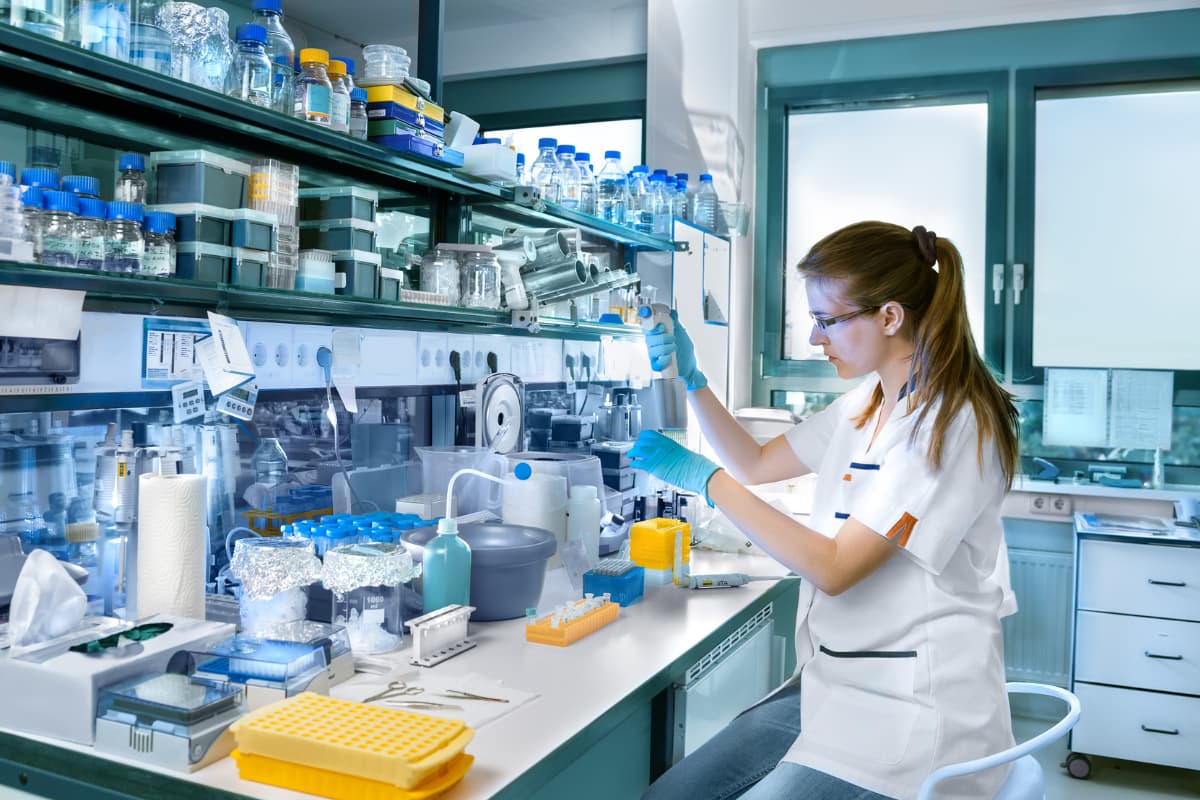Often, when someone pursues a career in the sciences, it’s with a desire to do hands-on work in a laboratory setting conducting research and experiments. For many, it isn’t until they are actually in the lab that they start to wonder what career advancement might look like in the field.
While there are many possible pathways for advancement as a laboratory scientist, one potentially fulfilling option is the role of laboratory manager.
Below, we explore this career, taking a look at the role and responsibilities of laboratory managers, as well as the salary and job outlook of the field. We also outline key steps that you can follow to earn this position, including potentially earning a degree.
What do laboratory managers do?
Generally speaking, a laboratory manager performs a wide range of duties and tasks related to overseeing the operations of a scientific laboratory. These duties are often split into groupings such as:
- Management: Ensuring compliance with all regulatory requirements; conducting laboratory inspections as necessary; reviewing laboratory protocols of all research groups (internal and external) so as to understand all projects occurring within the lab; overseeing and disciplining staff as required.
- Operations: Monitoring inventory and ordering supplies (chemicals, reagents, personal protective equipment, etc.) as necessary; scheduling laboratory and equipment time for staff; acting as a liaison between staff and key stakeholders.
- Training: Ensuring that all team members have been trained to use laboratory equipment, software, and supplies safely and efficiently.
- Safety: Updating the lab safety plan and safety data sheets (SDS) as necessary; scheduling safety training for new hires or team members entering new roles; enforcing policies around personal protective equipment.
- Maintenance: Overseeing the cleansing and sanitizing of the lab; ensuring all equipment and instruments function correctly, and initiating repair or maintenance of said equipment as necessary.
It is important to note that the specific duties that a lab manager will be expected to perform will depend on a number of factors, including the size and type of laboratory that they work in.
For example, lab managers at smaller organizations may find themselves responsible for a wider range of duties compared to lab managers at larger organizations, which might have the resources to distribute different types of tasks among a full management team. Similarly, the duties associated with managing a clinical lab vs. a research lab vs. a diagnostic lab will also naturally vary.
Download Our Free Guide to Advancing Your Biotechnology Career
Learn how to transform your career in an industry that’s transforming the world.
Lab Manager Salary and Career Outlook
While the United States Bureau of Labor Statistics (BLS) does not have data for generalist lab managers, it does hold data for natural sciences managers, which accounts for a large segment of lab managers. According to the BLS, these managers earn an average annual salary of approximately $129,100 per year, or $62.07 per hour—much higher than the average annual salary of $53,120 earned by clinical laboratory technicians.
Of course, salary can vary depending on a number of factors such as location. Below is a list of the average annual salaries for lab managers based on geographic location, as collected by Salary.com:
- San Francisco: $132, 200
- New York City: $127,663
- Boston: $119,085
- Washington D.C.: $116,764
- Seattle: $115,424
- Philadelphia: $113,335
- Chicago: $111,837
- Houston: $108,144
- Phoenix: $104,545
- Charlotte: $103,352
What’s more, the job outlook for lab managers is quite positive. By 2028, the BLS expects the demand for these professionals to grow by approximately 6 percent, adding an estimated 3,700 jobs to the field.
One particularly strong area of growth in the field of biotechnology, which has expanded rapidly in recent years and continues to experience impressive growth. According to research conducted by Global Market Insights, the global biotechnology market was approximately $417 billion in 2018. This is expected to grow to $729 billion by 2020, driven in part by advances in technology as well as improvements in consumer trust. As existing biotechnology companies expand and grow, and new companies emerge, they will naturally need more laboratory managers to helm their operations.
How to Become a Lab Manager
Required Skills
In order to effectively manage a laboratory, lab managers must be skilled in the technical aspects of their field, as it’s impossible to train and monitor staff if you yourself don’t know the best practices and protocols for different equipment and procedures.
Yet technical skills are not the only important abilities that lab managers must exhibit. Soft skills like communication and leadership are equally as vital to the work of a laboratory manager.
For example, the ability to communicate effectively doesn’t always come naturally to science professionals, but lab managers are responsible for communicating with not only their team members, but also key project stakeholders and even potentially an organization’s executive team. For this reason, lab managers must hone their communication skills and learn how to tailor their communication style depending on the audience they are communicating with—a skill that is especially important considering they may be speaking with individuals who are not as technically savvy as they are.
Management skills, the ability to collaborate and work on a team, adaptability, and problem-solving ability are also important skills for lab managers to possess.
In order to achieve the position of lab manager, you’ll also need an impressive understanding of your particular domain and that of the organization that employs you. A lab manager at a company that develops industrial chemicals, for example, will need to exhibit a different kind of expertise as opposed to a lab manager at a biotechnology company.
Educational Requirements
Broadly speaking, most companies and organizations prefer to hire laboratory managers who have earned at least a bachelor’s degree in a field of study related to the specific industry that they operate within. For example, a lab operating within the healthcare space may require a degree in medical technology, biomedical sciences, or biotechnology. This degree, paired with adequate experience working in the field, will make an individual eligible for potential job openings.
“Earning a bachelor’s degree and gaining five to ten years of experience is one way of becoming a lab manager,” says Jared Auclair, director of the biotechnology and bioinformatics programs at Northeastern. “If it’s a clinical lab, you’ll want to have clinical experience. If it’s a research lab, you’ll want to have research experience, etc.”
Auclair notes, however, that it is possible to accelerate this advancement by earning a graduate degree. In fact, career progression is one of the most common reasons that professionals choose to pursue a master’s degree or PhD in biotechnology.
“If you have a master’s degree you can become a lab manager more quickly, often with only one to two years of experience,” he says.
Choosing a Degree That Will Accelerate Your Career
If you are considering earning a master’s degree to help accelerate your career as a lab manager, Auclair notes that it is important to ensure you are selecting a degree that aligns with your career goals. If you work in—or hope to work in—a particular field or industry, the degree you pursue should ideally offer a concentration in that field.
The Master of Science in Biotechnology offered by Northeastern, for example, offers 10 different concentrations that students can declare to help tailor their education. These include:
- Agricultural biotechnology
- Biodefense
- Molecular biotechnology
- Process sciences
- Manufacturing and quality operations
- Biopharmaceutical analytical sciences
- Pharmaceutical technologies
- Scientific information management
- Regulatory science
- Biotechnology enterprise
This final concentration—biotechnology enterprise—integrates the science of biotechnology with business and management training in order to teach students the fundamental concepts of leadership, management, business development, financial decision making, innovation, and marketing skills. The result is graduates who are prepared to lead upon completion of the degree.
It’s also important to select a program that offers the opportunity for the real, hands-on learning experience that employers seek in candidates. Opportunities like internships, co-ops, and other forms of hands-on learning experiences all help you build and solidify skills that will set you apart from other candidates applying for the same roles.
“One of the great things about our program is the fact that we don’t have a thesis, but we do have a mandatory co-op,” Auclair says. “The program is designed to prepare students to meet the needs of the industry, and to help them transition into industry seamlessly.”
Learn more about Northeastern’s master’s in biotechnology program and how it can help you invest in your career.







Related Articles
Compliance Specialists: Who They Are and What They Earn
Science or Science Fiction? The Future of Personalized Medicine
In-Demand Biotechnology Careers Shaping Our Future